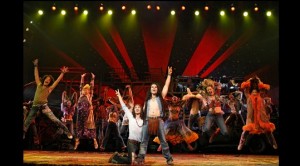
Not that Washington has ever been a hot bed for political theatre—Hair didn’t even come to the National until 1970, two years after its Broadway premiere in 1968—but in Fall 2012 there is a decided lack of almost anything political resembling a play. Sure, Molly Ivins and an utterly sanitized Janis Joplin entertain us at Arena and a little Government Inspector at Shakespeare makes us laugh our heads off, and Signature even claimed a bit of the political with its Whorehouse (no kidding, it did). Other than those token expressions, however, our theatre avoids political content almost as fiercely as Republicans and Democrats avoid each other.
And I’m happy about that. For in America today the political has become nothing more than theatre on a grand scale, played out daily in the world of pundits and competing 24-hour news outlets. So I’m happy for the respite that local theatre can offer. Yes, I’m thankful for a Jekyll and Hyde, for aDracula and Joseph and even a little Rocky Horror, for they provide a break from the constant barrage of political theatre swarming around Washington, DC, these days.
…it is a good thing that Washington’s theatre has decided to leave the political theatre to the politicians and their master strategists.
Now, I’ll admit to yearning once for more political content in plays, to hoping for an American canon that addressed the intense struggle in this country between the Right and the Left or the Federalists and the States’ Righters. After all, there is a place for theatre in the world of politics. Theatre during the French Revolution—and during our own 1960s—proved that the stage could play a role in the forming of public opinion. Even the imports that have come to town this Fall, Black Watch and theFamine, showed that when theatre does politics it could do a first class job.
This election cycle has, however, enlightened me to a greater truth. Theatre creates a world of illusion and mystery, which can temporarily suspend our disbelief and allow us to observe and emotionally engage in fictional people and events. Politics, on the other hand, creates a totally different kind of theatre; it creates a theatre that suspends our beliefs and allows us to fictionalize real people and events. In other words, within the theatre of politics, beliefs become truths and people and events become fictions. This inversion of fact and fiction allows the theatre of politics to trump anything the real theatres might produce.
So it is a good thing that Washington’s theatre has decided to leave the political theatre to the politicians and their master strategists.
Now, saying that, doesn’t mean that I don’t have a few criticisms of the drama that these political players have produced. However this script ends, I think we can all admit that it is a good thing that it is finally coming to an end—I’m also sure we can agree that this play was way too long and needed the last 10 acts cut. We’re all happy too that the climax has arrived, if not tonight, then hopefully early tomorrow. And we can only pray that this bit of politics-does-theatre doesn’t have a sequel, entitled “Supreme Court Decision II” playing for the next few months on stages everywhere.
